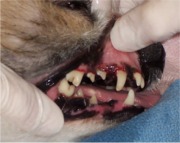Poor
Dental Health is Dogging Pets, Too
Problems In Your Pet's Mouth Can Lead
To Serious Health Problems
Collinsville, OK (Feb
14)- Thanks to plenty of lectures from dentists, we're all aware of the need
to brush and floss our teeth regularly. But did you know that you also need
to pay attention to your pet's teeth? February is National Pet Dental Health
Month and a good time to become aware of the importance of proper care for
your pet's pearly (or not-so-pearly) whites.
Research shows that when bacteria in your pet's mouth accumulate on his or
her teeth, plaque and tartar form. Without proper oral care, this build-up
of plaque and tartar may lead to periodontal disease and tooth loss. The bacteria
associated with periodontal infections also have the potential to spread to
other organs such as the heart, liver and kidneys.
In fact, studies show that 80 percent of dogs and 70 percent of cats show
signs of oral disease by the time they are three years old. Oral disease is
the most frequently diagnosed health problem for pets. Fortunately, oral disease
can be controlled and in some cases reversed.
"If your pet's mouth isn't healthy, then your pet isn't healthy,"
said Dr Bob McCraw, a veterinarian at Eastside Veterinary Hospital in Collinsville,
OK. "Your pet's mouth is a big line of defense in protecting against
disease, and appropriate home care is critical in helping to prevent oral
disease."
The American Veterinary Dental Society (AVDS) recommends a three-step program
to help pet owners keep their pets' mouths bacteria free and healthier:
1. Take Your Pet to the Veterinarian For a Dental Exam. Your pet's veterinarian
is also your pet's dentist. As part of your pet's annual exam, he or she will
receive a health checkup that includes a thorough physical exam and a dental
check. If plaque and tartar build-up are a problem, your pet's veterinarian
will probably recommend a dental cleaning.
2. Start a Home Dental Care Routine. Your pet's veterinarian will also suggest
steps you can take at home to help keep your pet's teeth clean. This could
include regular brushing and special pet foods with dental benefits.
3. Get Regular Veterinary Checkups. Follow-up is important because plaque
continues to build up on your pet's teeth every day. Some pets, such as small
dogs, tend to accumulate plaque and tartar more quickly. Tooth brushing and
regular dental cleanings are especially important for these pets.
For more information about dental care for your pet, visit the 'Pets Need
Dental Health, Too' site at www.petdental.com.
Eastside Veterinary Hospital provides high quality medical and surgical veterinary
care to pets in the Collinsville, Owasso and surrounding areas. Services include
comprehensive medical, dental and surgical health care, as well as nutritional,
geriatric and flea control consultations. During the month of February all
dog and cat dentals will be 20% off the regular price. The hospital is located
at 13420 E 146th St N, next to Mazzio's or visit www.eastsideveterinaryhospital.com
for more information.
# # #

